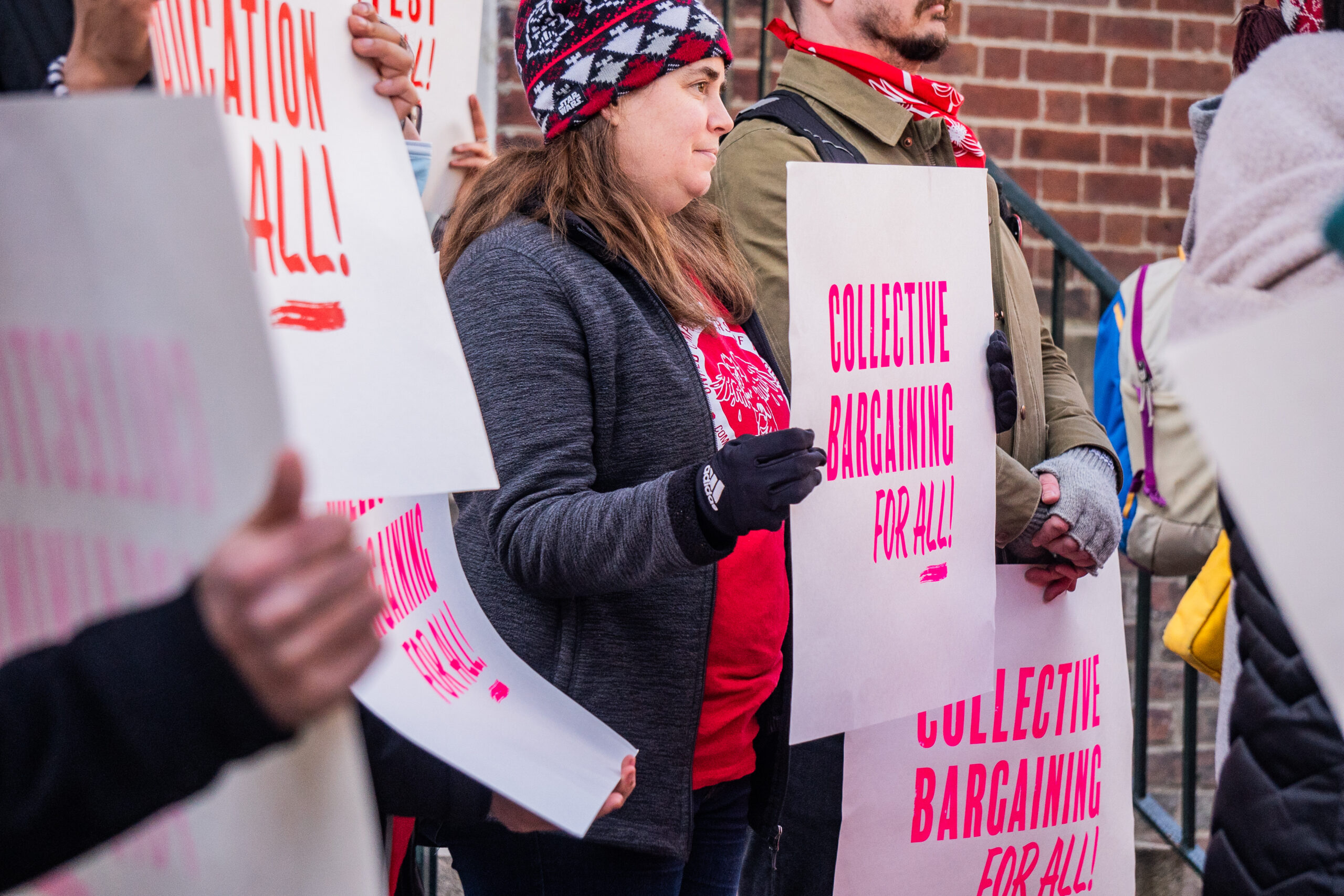Organizers across Virginia are again asking the General Assembly to pass legislation that would expand collective bargaining rights to include state employees.
While a worker’s right to collectively bargain in Virginia was partially restored in 2021, the bill included a number of limitations and exceptions. State employees, including those employed by public institutions like the University of Virginia, were barred entirely from collective bargaining.
“In 2020, when the first law to restore some public sector collective bargaining rights was passed … it was really gutted,” says Cecelia Parks, an organizer for the Political Coalition and Policy Committee of the United Campus Workers chapter at UVA. “It initially started out as a very strong law … but then was really gutted by Democrats in the [state] Senate.”
State employees can still organize and join unions like UCWVA under current Virginia law, but the ban on collective bargaining constrains the unions’ ability to meaningfully improve conditions for members.
“Right now, every contract at the university is negotiated with an individual,” says Parks, who works as an academic librarian at UVA. “A union-negotiated contract would make everything a lot more clear. There would be a really clear grievance process within the union if the contract is not being followed. … This current legislation would create a public employee relations board that would add an external layer around grievances.”
Even in localities with ordinances allowing collective bargaining, like Charlottesville and Albemarle County, state employers have no requirement to meet with employee organizers—something Ben Doherty, the face of UCW’s anti-retaliation campaign at UVA, can attest to.
“Since last summer, we’ve done three different delegations to different university administrator offices,” says Doherty. “When we went to President [Jim] Ryan’s office, they literally locked the doors to the president’s office on us—the president’s office of a public university. … In none of those circumstances were we being disruptive or rowdy or anything like that. We were simply asking to talk. In all three circumstances, they refused to speak to us as union members.”
On May 4, 2024, Doherty was arrested while participating in the pro-Palestine encampment at UVA. After the arrest, Doherty received a “letter of counseling”—which they describe as “basically a written threat of termination”—and was told they would likely be terminated if they protested again at UVA.
UCWVA’s anti-retaliation campaign has focused on the university’s response to the pro-Palestine encampment last May and actions taken against employees like Doherty. Doherty has worked at the UVA law school for more than 20 years and first received a letter of counseling for protesting in 2018. To their knowledge, there is no way to appeal the decision and they are the only UVA employee to receive a letter of counseling in connection with the encampment.
“There’s no good way to know who has received letters of counseling for what they’re supposed to be used for: employment problems,” says Doherty. “For me, [UVA is] using them for protest activity that I engaged in outside the context of my job on a Saturday, which is not during my working hours.”
Organizers calling for increased and accurate payment for graduate student workers are also rallying behind the call for collective bargaining. By getting agreements in writing, Gabriel Costello says UCWVA can more effectively enforce promises from the administration.
“We’ve made progress on the [Cut the Checks, a UCWVA movement to address late payments to graduate students] campaign with bringing the administration to the table and getting them to make certain promises, but we have no legal recourse, or nothing in writing,” says Costello. “We would love to be able to take the administration’s word for it, but they’ve shown time and again that … we can’t trust them, and we feel very strongly that a union contract would guarantee better working conditions for not only our members, but campus workers across both UVA and the rest of the state universities here in Virginia.”
While UVA has told the union it has fulfilled its agreement to hire additional employees to ensure timely and accurate payments, UCWVA continues to report issues. UVA has responded to the union’s complaint by indicating that it had not received any formal reports of payment issues, despite what union members were sharing.
“We feel very strongly that a university that has a $13 billion endowment, a university that puts itself forward as one of the top universities in the country, should be able to pay its workers a living wage,” says Costello. “It’s not a question of if they’re able to; it’s a question of where their priorities are.”
For now, UCWVA remains unable to negotiate on behalf of its members, and likely won’t be able to even if legislation restoring collective bargaining rights passes the General Assembly. Similar legislation that passed during previous sessions has been vetoed by Gov. Glenn Youngkin, who is expected to once again kill the bill.
Still, Parks says this session provides an opportunity to get representatives on the record supporting the amendment ahead of November’s state elections.
“United Campus Workers are still going to be out here. We’re still going to be fighting for workers to the extent that we can,” says Parks. “But that is not going to happen over a bargaining table until the law changes.”
Local Afghans and advocates lobby for exception to refugee pause
A group of Afghan immigrants that resettled in Charlottesville visited Washington, D.C., with Central Virginia Afghan Advocates on February 6, calling for an exception to an executive order stopping all refugee admissions to the United States.
The January 20 order called for a pause of admissions for at least 90 days, with section four of the document stating the pause will continue until President Donald Trump “determine[s] that resumption of the [United States Refugee Admissions Program] is in the interest of the United States.”
While thousands of Afghans who worked with the U.S. government were promised Special Immigrant Visas, the rapid takeover of Afghanistan’s government by the Taliban in August 2021 created a backlog in SIV processing.
“The SIV process has been incredibly challenging and time consuming,” says Kristin Clarens with the Charlottesville Albemarle Bar Association. For many Afghans, the SIV process is still ongoing more than three years after the U.S. exit from Afghanistan, which has delayed admission of their family members into the United States.
“When it was starting to look like SIV processes were going to get terminated or were just not making progress, they applied for asylum and were granted asylum,” says Clarens. “Because they were granted asylum, their family members are considered refugees and are paused indefinitely under these executive orders.”
Under the EO, all work toward reuniting Afghan asylum seekers who collaborated with the American government with their families has been stopped.
A coalition of refugee advocacy organizations filed suit against the Trump administration on February 10 in Seattle, calling for the resumption of resettlement programs and release of appropriated funding for refugees. Trump has not indicated any exemptions to the EO as of press time.






